Films with theme "Documentary films about politics", sorted by revenue
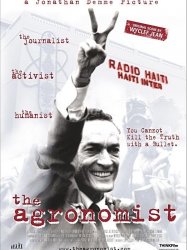
The Agronomist (2004)
, 1h30Directed by Jonathan Demme
Origin USA
Genres Biography, Documentary
Themes Seafaring films, Transport films, Documentary films about historical events, Documentaire sur une personnalité, Documentary films about politics, Political films
Actors Ronald Reagan
Le journaliste Jean Dominique, militant avec sa femme Michèle Montas pour une information accessible par Radio Haïti-Inter en Haïti, relate différents épisodes de sa lutte. Le récit direct et honnête qu’il fait, à partir de 1986 à son ami Jonathan Demme et le tournage dans le pays, montrent toute la sympathie et la solidarité que réserve le peuple haïtien à ceux qui prennent réellement son parti, en même temps que le caractère périlleux de la promotion de l’information libre dans le pays. Combattant et exilé, celui qui se faisait appeler l’agronome, en fonction de sa formation de base, n’a jamais interrompu sa lutte jusqu’à son assassinat en 2000.

Genres Documentary
Themes Politique, Documentary films about historical events, Documentary films about politics, Political films
The Revolution Will Not Be Televised opens in 2001 with footage of Chávez as he tours the country. Met with "popular enthusiasm", he speaks at rallies, decrying neoliberalism and the international community's attacks on his character. The film outlines Chávez's rise to power, before covering his day-to-day routine and appearances on his television show, Aló Presidente, which includes a phone-in for citizens to speak with the president. Chávez outlines his aspiration to be seen as a modern-day Bolívar.
[...]See more...

Rats in the Ranks (1996)
, 1h33Genres Documentary, Historical
Themes Seafaring films, Transport films, Documentary films about politics, Political films
 , 1h58
, 1h58Directed by Alex Gibney
Origin USA
Genres Documentary
Themes Documentary films about historical events, Documentaire sur une personnalité, Documentary films about politics, Political films
Actors Stephen Colbert, Penélope Cruz, Alex Gibney
Une plongée dans l'ascension et la chute du gouverneur de New York Eliot Spitzer, comprenant des interviews avec le politicien, objet d'un scandale lié à sa relation avec des prostituées.
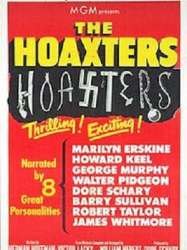
The Hoaxters (1952)
, 36minutesDirected by Herman Hoffman
Origin USA
Genres Documentary
Themes Documentary films about politics, Political films
Actors Marilyn Erskine, Howard Keel, George Murphy, Walter Pidgeon, Dore Schary, Barry Sullivan
 , 1h58
, 1h58Directed by Alex Gibney
Origin USA
Genres Documentary
Themes Documentary films about law, Documentary films about historical events, Documentary films about politics, Political films
Actors Paul Rudd, Angela Lansbury, Dolph Lundgren, Ronald Reagan, George C. Scott, James Stewart
The film focuses on the career of Washington, D.C. lobbyist, businessman, and con man Jack Abramoff, who was involved in a massive corruption scandal that led to the conviction of himself, two Bush White House officials, Rep. Bob Ney, and nine other lobbyists and congressional staffers. Abramoff was convicted of fraud, conspiracy, and tax evasion in 2006 and of trading expensive gifts, meals and sports trips in exchange for political favors. As of December 2010 Abramoff has completed his prison sentence.

Death of a President (2006)
, 1h33Directed by Gabriel Range
Origin United-kingdom
Genres Drama, Science fiction, Thriller, Documentary, Fantasy, Crime
Themes Assassinat, Documentaire sur une personnalité, Documentary films about politics, Political films
Actors Becky Ann Baker, Michael Reilly Burke, James Urbaniak, Christian Stolte, Tab Baker, John Loprieno
Broadcast in the year 2008, the film is presented in a TV documentary style format, combining talking head interviews, news coverage clips and video surveillance footage surrounding the assassination of U.S. President George W. Bush in Chicago around a year earlier on 19 October 2007. The president is fatally shot by a sniper after he addresses an economic forum at the Chicago Sheraton Hotel, before which an anti-war rally had taken place. News outlets immediately begin reporting on the incident along with its political ramifications.
[...]See more...

The Wedding in Monaco (1956)
, 31minutesGenres Documentary
Themes Documentary films about historical events, Documentaire sur une personnalité, Documentary films about politics, Political films, Films about royalty
Actors Grace Kelly
Un documentaire sur le mariage princier, en 1956, entre l'actrice Grace Kelly et le Prince Rainier de Monaco.

Nostalgia for the Light (2010)
, 1h30Directed by Patricio Guzmán
Origin Chili
Genres Drama, Documentary
Themes Seafaring films, Politique, Transport films, Documentary films about law, Documentary films about politics, Political films, Films about Latin American military dictatorships
Actors Patricio Guzmán, Víctor González
Nostalgia for the Light opens with a view of a telescope and images of our moon. The narrator, Patricio Guzmán, describes how he came to love astronomy and begins to remember his childhood where “only the present moment existed.” Soon, Chile became the center of the world as astronomers and scientists flocked to Chile to observe the universe through the thin and clear skies. We next see Guzmán walking in the Atacama Desert, a place with absolutely no moisture, so much so that it resembles the surface of Mars.
[...]See more...
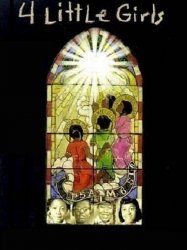
4 Little Girls (1997)
, 1h42Directed by Spike Lee
Origin USA
Genres Documentary, Historical
Themes Films about racism, Films about terrorism, Documentary films about racism, Documentary films about law, Documentary films about war, Documentary films about historical events, Documentaire sur une personnalité, Documentary films about politics, Documentary films about terrorism, Political films
Actors Ossie Davis, Spike Lee, Bill Cosby, Walter Cronkite
Film documentaire, 4 little girls revient sur l'attentat à la bombe dans une église afro-américaine qui, en 1963, tua quatre fillettes âgées de 11 à 14 ans.

The Square (2013)
, 1h48Directed by Jehane Noujaim
Origin Egypte
Genres Drama, Comedy, Documentary, Historical
Themes Documentary films about historical events, Documentary films about politics, Political films
Actors Khalid Abdalla
Le film traite de la Révolution égyptienne de 2011 jusqu'à la revolution du 30 juin 2013 contre Mohamed Morsi, et notamment des manifestations s’étant déroulées Place Tahrir.
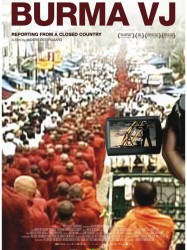 , 1h24
, 1h24Directed by Anders Østergaard
Origin Danemark
Genres Documentary
Themes Documentary films about historical events, Documentary films about politics, Political films
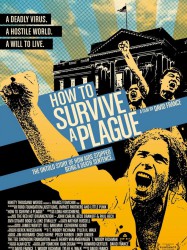
How to Survive a Plague (2012)
, 1h49Origin USA
Genres Biography, Documentary, Historical
Themes Medical-themed films, Films about sexuality, LGBT-related films, Documentary films about historical events, Documentaire sur l'homosexualité, Documentary films about politics, Documentary films about health care, Political films, LGBT-related films, HIV/AIDS in film, LGBT-related film
Actors Larry Kramer
Le film traite des premières années de l'épidémie du SIDA, et des efforts d'Act up et de Treatment Action Group .

The Undefeated (2011)
, 1h53Origin USA
Genres Documentary
Themes Documentary films about historical events, Documentaire sur une personnalité, Documentary films about politics, Political films
Actors Pamela Anderson, Joy Behar, Sandra Bernhard, Louis C.K., John Cleese, Ellen DeGeneres
The film is constructed in three acts. The film opens with a montage. The first act concerns itself with Palin's experiences as the mayor of Wasilla. The second act is about Palin's half term as governor of Alaska. The third act, titled "From here, I can see November," revolves around her candidacy as vice-president and her rise to national prominence. It goes into detail how she became the darling of the Tea Party movement. The film ends with clips of the Madison rally where Palin challenged Republicans to: "Fight like a girl.
[...]See more...
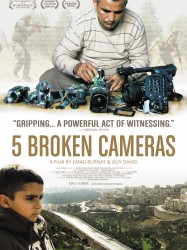
Five Broken Cameras (2011)
, 1h34Origin Israel
Genres Drama, War, Documentary, Crime
Themes Films set in Africa, Films about films, Films about religion, Documentary films about business, Documentary films about the film industry, Documentary films about law, Documentary films about war, Documentary films about historical events, Documentaire sur une personnalité, Documentary films about politics, Documentary films about religion, Political films, Films about Jews and Judaism, Documentary films about films
There are five cameras — each with its own story. When his fourth son, Gibreel, is born in 2005, self-taught cameraman Emad Burnat, a Palestinian villager, gets his first camera. At the same time in his village of Bil’in, the Israelis begin bulldozing village olive groves to build a barrier to separate Bil'in from the Jewish Settlement Modi'in Illit. The barrier's route cuts off 60% of Bil'in farmland and the villagers resist this seizure of more of their land by the settlers.
 Connection
Connection